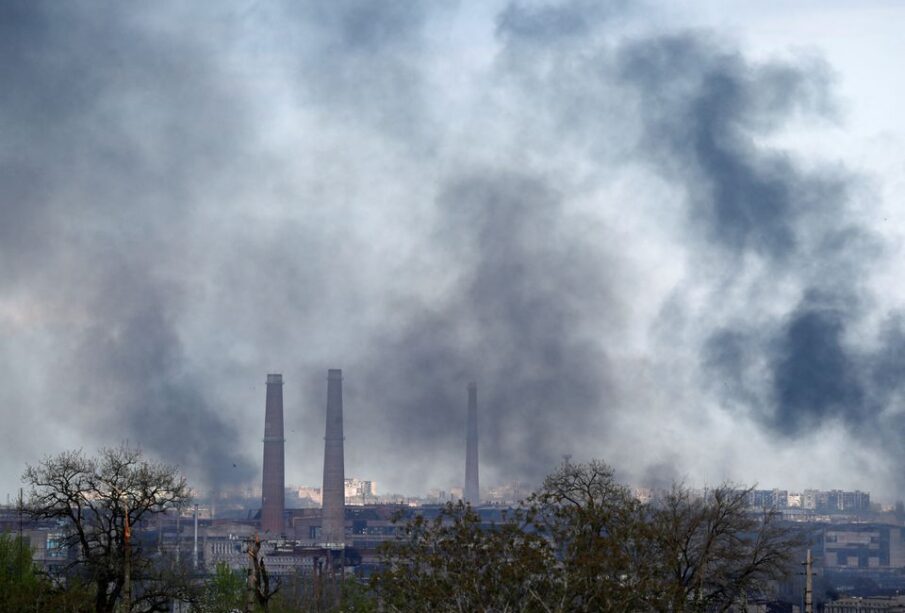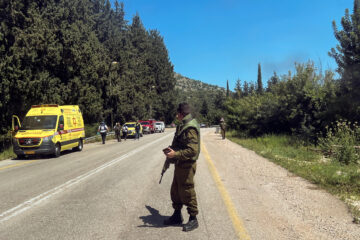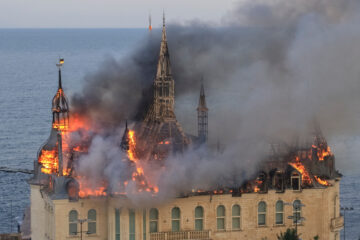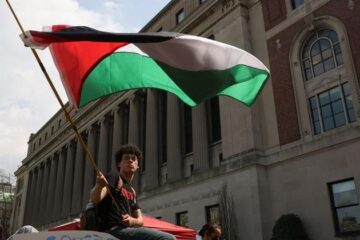Russian offensive devastates towns in eastern Ukraine
 Members of indigenous communities camp on the property of Chinese-owned Las Bambas copper mine, in Las Bambas, Peru April 26, 2022. REUTERS/Angela Ponce/File Photo
Members of indigenous communities camp on the property of Chinese-owned Las Bambas copper mine, in Las Bambas, Peru April 26, 2022. REUTERS/Angela Ponce/File PhotoRussian forces shelled Kharkiv, Ukraine’s second largest city, and devastated several towns in eastern Ukraine, while the European Union prepared sanctions on Russian oil sales after Germany said it was ready to back an embargo.
Russia launched a major offensive in eastern Ukraine focused on the Donetsk and Luhansk after abandoning an assault on Kyiv at the end of March. Parts of those provinces were already held by Russian-backed separatists before President Vladimir Putin launched the invasion on Feb. 24.
Ukraine’s First Lady Olena Zelenska asked the West to maintain its support.
“Ukraine needs weapons so that Ukrainian refugees can return home and rebuild the economy. Therefore, we ask you not to stop, to accelerate the pace of heavy weapons provision,” she told told British morning television.
The northeastern city of Kharkiv was under bombardment, as it has been since the early days of the invasion, the Ukrainian military said on Tuesday.
Giving an early update on battle front, Ukraine’s general staff said its forces were defending the approach to Kharkiv from Izyum, a town on the Donets river, some 120 km (75 miles) to the southeast, as the enemy left a trail of destruction in Luhansk province.
Ukraine’s military said Russian forces were trying to take the frontline Luhansk province town of Rubizhne and prepare an assault on nearby Sievierodonetsk.
The heaviest clashes were taking place around Popasna, farther south. Shelling was so intense it was not possible to collect bodies, said regional Governor Serhiy Gaidai.
”I don’t even want to speak about what’s happening with the people living in Popasna, Rubizhne and Novotoshkivske right now. These cities simply don’t exist anymore. They have completely destroyed them.”
Russian troops are now trying to encircle a large Ukrainian force there, attacking from three directions with massive bombardment along the front.
At least three civilians were killed in Russian shelling of the city of Vuhledar in the Donetsk region of eastern Ukraine on Tuesday, the Ukrainian president’s office said.
Some other areas of Donetsk were under constant fire and regional authorities were trying to evacuate civilians from frontline areas, it said.
Reuters could not independently verify Ukraine’s battlefield accounts.
In Brussels, the European Commission is expected to propose a sixth package of EU sanctions this week against Russia, including a possible embargo on buying Russian oil.
Kyiv says Russia’s energy exports to Europe, so far largely exempt from international sanctions, are funding the Kremlin war effort with millions of euros every day.
“This package should include clear steps to block Russia’s revenues from energy resources,” Ukrainian President Volodymyr Zelenskiy said in his nightly video address.
Germany said on Monday it was prepared to back an immediate EU embargo on Russian oil.
“We have managed to reach a situation where Germany is able to bear an oil embargo,” German Economy Minister Robert Habeck said.
Chancellor Olaf Scholz, who has been more cautious than other Western leaders in backing Ukraine, has been under growing pressure to take a firmer line.
Scholz vowed sanctions will not be lifted until Russian President Vladimir Putin signs a peace deal with Ukraine that Kyiv can support, he said in an interview with ZDF public television.
Ambassadors from EU countries will discuss the proposed oil sanctions when they meet on Wednesday.
The first civilians to be evacuated from a giant steel plant in Mariupol arrived on Monday in the Ukrainian-held city of Zaporizhzhia after an overnight bus journey across the front-line.
Ukraine says hundreds of civilians have been trapped inside the Azovstal plant along with the city’s last Ukrainian defenders.
Captain Sviatoslav Palamar, 39, a deputy commander of Ukraine’s Azov Regiment, told Reuters from inside the plant that fighters could hear voices of women, children and elderly people trapped below ground, and lacked the equipment to dig them out.
“We were planning to tear up the bunkers, the entrance to which is blocked, but all night into Monday naval artillery and barrel artillery were firing. All day today aviation has been working, dropping bombs,” Palamar said by Zoom.
Pope Francis said in an interview published on Tuesday that he asked for a meeting in Moscow with Putin to try to stop the war in Ukraine but has not received a response.
The pope also told Italy’s Corriere Della Sera newspaper that Patriarch Kirill of the Russian Orthodox Church, who has backed the war “cannot become Putin’s altar boy”.
The pope told the newspaper that Hungary’s Prime Minister Viktor Orban had told him Russia planned to end the war on May 9, which Russia celebrates as “Victory Day” marking Nazi Germany’s surrender in 1945.
Russian Foreign Minister Sergei Lavrov said earlier this week that Moscow, would not rush to end its “special military operation” in Ukraine to meet that symbolic date.
SOURCE: REUTERS









